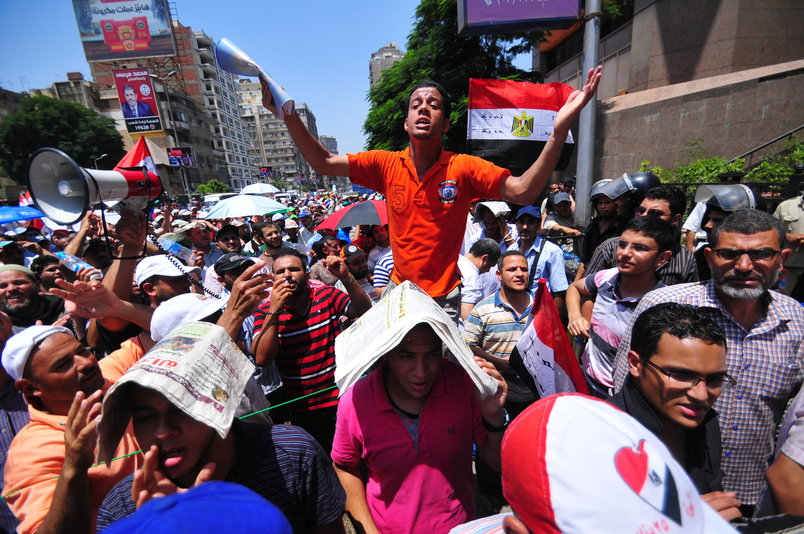Desperate to hold onto power, Pervez Musharraf has discarded Pakistan’s constitutional framework and declared a state of emergency. His goal? To stifle the independent judiciary and free media. Artfully, though shamelessly, he has tried to sell this action as an effort to bring about stability and help fight the war on terror more effectively. Nothing could be further from the truth. If Pakistan’s history is any indicator, his decision to impose martial law may prove to be the proverbial straw that breaks the camel’s back.
General Musharraf appeared on the national scene on Oct. 12, 1999, when he ousted an elected government and announced an ambitious “nation-building project. Many Pakistanis, disillusioned with Pakistan’s political class, remained mute, thinking that he might deliver. The Sept. 11, 2001, terrorist attacks on America brought Musharraf into the international limelight as he agreed to ditch the Taliban and support the United States-led war on terror.
Musharraf clamped down on some religious militants operating inside Pakistan and also on those fighting Indian forces in Kashmir. As a result, Pakistan was rewarded with American financial assistance and arms. In furtherance of his re-alignment, Musharraf sent the Pakistani army into the tribal areas bordering Afghanistan for the first time since Pakistan’s independence. Operations there against Taliban and Al-Qaeda forces brought mixed results.
Although the US viewed Musharraf as an agent of change, he has never achieved domestic political legitimacy, and his policies were seen as rife with contradictions. For example, he made alliances with Islamist political forces (who in 2004 voted for constitutional changes legitimizing his position and actions). At the same time, he sidelined moderate, mainstream political leaders while claiming that he stood for “enlightened moderation. A series of ill-planned military operations in the tribal areas further complicated the situation in the volatile border region.
Last March, Musharraf took his boldest step, removing the Chief Justice of the Supreme Court, Iftikhar Chaudhry. To the surprise of many, the country’s legal community organized a nation-wide movement to restore the Chief Justice to his post. Hundreds of thousands of ordinary people demanded the rule of law and the supremacy of the constitution, emboldening the judiciary and changing the country’s political dynamic. In a historic ruling that Musharraf had little choice but to accept, the Supreme Court itself reinstated the Chief Justice in July.
Subsequently, the energized judiciary continued ruling against government decisions, embarrassing the government – especially its intelligence agencies. Government officials were held accountable for actions that were usually beyond the reach of the law, ranging from brutal beatings of journalists, to illegal confinement for “national security.
Musharraf and his political allies tried to adjust to this new reality, but their patience ran out when the Supreme Court took up petitions against Musharraf’s decision to run for president. According to the constitution (originally promulgated in 1973 by an elected parliament), a serving military official cannot run for an elected office. Musharraf was not ready to give up his military post, but also wanted to be a civilian president. While he announced that he would leave his military position “if he was elected president, his track record of reneging on his promises haunted the judiciary.
The proceedings of the court over the last few weeks made Musharraf jittery. The decision of the 11-member bench might easily have gone against him. Legally cornered, Musharraf has now decided to abandon constitutionality, removing the leading judges of the Supreme Court and provincial high courts and putting curbs on the media. Lawyers, human rights activists, and political leaders have since been arrested.
There is widespread public resentment in response to these moves. Rather than taking responsibility for the deteriorating security situation (as evidenced by regular suicide bomb attacks) and the increasing Talibanization of the tribal areas, Musharraf has tried to blame the judiciary and media. To be sure, in some cases, judicial activism was obvious (though within the realm of constitutional law), and the media also made mistakes; but by no stretch of the imagination can these be linked to religious extremism or support for militancy.
It is unlikely that Musharraf’s latest gambit will succeed, as his popular support is at its lowest ebb. Pakistan’s armed forces – repeated targets of suicide bombers – have become demoralized. It is difficult to imagine them standing with Musharraf should civil conflict erupt. Nor can a weak, embattled, and disoriented Musharraf be expected to fight Islamic militancy effectively or bring political stability to Pakistan.
Opposition political parties are drawing closer together, and former Prime Minister Benazir Bhutto, despite progress in her power-sharing negotiations with Musharraf, has strongly condemned his actions. Human rights bodies, media associations, and lawyers’ organizations are expected to defy the emergency, which will pit them against the security forces.
Terrorists may also benefit by attacking a preoccupied army and political forces aligned with Musharraf. In the event of sustained protests and potential violence, top military commanders may decide to send Musharraf home – a decision that would not be unprecedented in Pakistan’s chronically turbulent history.
Hassan Abbasserved in the administrations of both Prime Minister Benazir Bhutto and President Pervez Musharraf. He is now a research Fellow at Harvard University’s Kennedy School of Government and is the author of “Pakistan’s Drift into Extremism: Allah, the Army and America’s War on Terror. This article is published by Daily News Egypt in collaboration wit Project Syndicate, www.project-syndicate.org.

